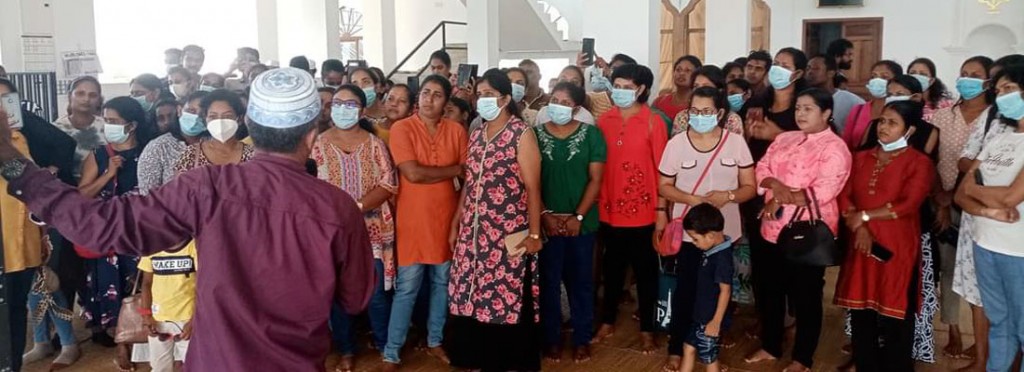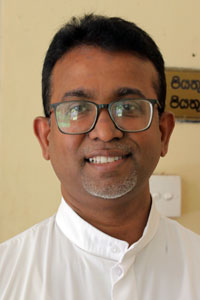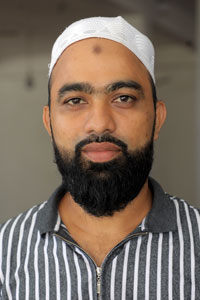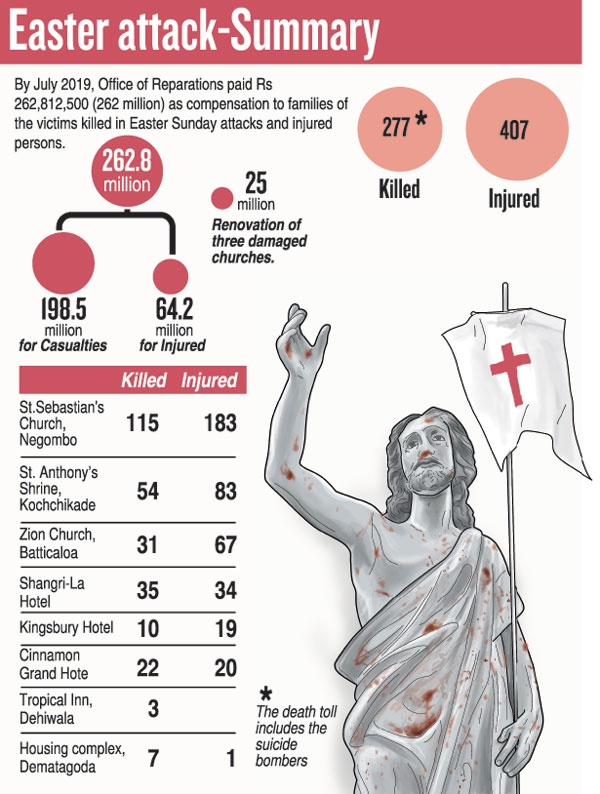News
Four years after terror attacks, Muslims and Christians inching towards amity in Negombo
View(s):- Both communities want to know the truth behind Easter Sunday bombings
- Inter-faith initiatives help dispel misunderstanding and misinformation
By S. Rubatheesan
Four years after the Easter Sunday attacks, Christians and Muslims in multiethnic Negombo are still trying to repair the damage that threatened communal and religious harmony between communities that lived side-by-side for centuries.
Mohammed Fazal Rasmin still remembers months of uncertainty when he feared his electric appliances business was gone. The reason: a well-coordinated campaign to boycott Muslim-owned enterprises, against the backdrop of the anti-Muslim sentiment that prevailed at that time.

Ash Sheik Muneer Mulaffer, Moulavi and Chief Advisor at the Ibrahimiya Masjid Thihariya in Gampaha at "Welcome to my Masjid" initiative, part of an interfaith dialogue between communities
“Eventually, people realised it was not us [Muslims] who were responsible for the bombings but a fringe group,” said Rasmin, 34, from Katuwapitiya in Negombo. “Today, most customers who buy electric items from me on an instalment basis are from the Christian community. But there is still much to heal.”
Recently, a Catholic family that lost seven members in the attack on St. Sebastian’s Church bought items from him.
For Christians, it is a question of justice and closure. They have had neither. For Muslims, it is the unfair portrayal of an entire community and being held accountable for the attacks despite having repeatedly denounced the violence. Both sides are struggling to heal and it has not been easy.

Fr Manjula Niroshan Fernando, parish priest of St Sebastian’s Church
“Although we are welcomed into their homes when we go to collect instalments, we also have a guilty feeling,” said Rasmin. “That’s why we should know the truth of what happened.”
His view was echoed by Imdat*, 34.
His family didn’t support the idea when he decided to reopen his restaurant at its old address in Periyamulla, Negombo, after what had happened on April 21, 2019.
He had been forced to close it down after running it successfully for years. Angry, violent mobs had targeted Muslim shops in the area shortly after terrorists attacked hotels and churches, killing more than 272 people and injuring more than 400.
And just days after the terrorist attacks, Imdat was picked up by police. This was after his photos were taken from his Facebook page and edited to imply he had links to radical Muslim groups while working in South Korea. They went viral. He was granted bail after two months. The case is pending. He has spent Rs. 2mn on legal fees. And it has affected his family.
Everything he saved from working as a migrant worker in South Korea for five years was invested in his business. “Now everything is gone,” he said. “Now, I have to start from zero.” He had just started his restaurant again under a different name.
Imdat is convinced that traders in his area–jealous of his business–implicated him in the police case. The traders–who were not from the Christian community–openly urged the area people to boycott Muslim-owned shops.
Imdat says he has nothing to fear because he has not done wrong. He says he cannot set up a business somewhere else because he is familiar with his turf. And now, his old customers are coming back. The bad news, as it is for Rasmin, is that the economic crisis has significantly curbed the people’s spending power.
Dozens of other Muslim families were forced to temporarily relocate to safe areas and shut the doors of businesses in neighbourhoods where anti-Muslim sentiment was high. There was also the threat of angry, violent mobs. At least one person was killed in Negombo and shops and mosques were damaged in mob violence in the aftermath of the bomb attacks.

Mohammed Fazal Rasmin still remembers months of uncertainty. Pix by M A Pushpa Kumara
Tensions cooled only after Colombo’s Archbishop, Malcolm Cardinal Ranjith, publicly urged Christians “not to raise a hand against the Muslims as they are not behind the attacks”. He also visited a mosque in Negombo as a gesture of inter-religious peace.
“His visit reiterated trust in the Muslim community and ensured religious harmony in the area,” says Fr. Manjula Niroshan Fernando, parish priest of St. Sebastian’s Church. “There was some disturbance in the minds of the people. With time, those are now settled.” Fr. Fernando had accompanied the Cardinal during that visit.
The parish lost 93 worshippers, including 27 children. It currently supports more than 200 affected families with medicine, trauma counselling, and housing needs in addition to educational assistance for the children.
Even during recent anti-government protests in the area, arguments broke out among groups from various communities, Fr. Fernando said, adding that he and his assistants intervened to resolve the problems amicably.
There are signs of progress. Religious leaders and civil society held interfaith programmes to bring Christians and Muslims closer following religious tensions fuelled by misinformation.
Ash Sheikh Muneer Mulaffer, a moulavi and chief Advisor at the Ibrahimiya Masjid in Thihariya, was part of the “Welcome to my Masjid” initiative that saw people from all walks of life being invited to mosques to get a firsthand understanding of Muslim religious beliefs and customs.
“It was a learning and unlearning process for many,” Moulavi Muneer recalled. “Participants were encouraged to ask questions to clear their doubts about the community and its practices.” Many attendees repeated false stories from social media. They shed their pre-notions after witnessing mosque affairs and through open dialogue, he said.
According to civil society activists, the Easter Sunday attacks were the culmination of a carefully coordinated anti-Muslim campaign that was initiated by certain elements in 2013 starting from anti-Muslim violence in Aluthgama (2014), Digana (2018), to unsubstantiated allegations against a medical doctor that he performed illegal sterilisations (2019).
“The Easter Sunday attacks came in the context of the majority community feeling insecure, particularly some kind of antipathy towards Muslims,” Javid Yusuf, a former Commissioner of the Human Rights Commission of Sri Lanka, told the Sunday Times. “From the Muslim community’s point of view also, this attack was a bolt from the blue because they were never a party to it and never thought something like this would happen.”
He stressed that the inhuman act was the work of a radical group that did not articulate any grievances on behalf of Muslims: “Historically, Christians and Catholics have had no issue with Muslims in the country. Going further, both communities follow Abrahamic religions. Then why did this happen, and how? This is the pressing question. Muslims also want the truth because they are unfairly portrayed in society.”
The Cardinal has repeatedly asked for an independent investigation to determine who the masterminds behind the attacks were, despite a Presidential Commission of Inquiry (CoI) having looked into them and produced a report. If domestic mechanisms failed to provide truth and justice to victims, he has said he’d be compelled to seek justice through an international probe.
While Muslims across the country observed Ramadan, many Muslims at Akurana in Kandy were tense on April 18, just three days before the fourth anniversary of the Easter Sunday tragedy. This was after police warned of an impending bomb attack on a mosque there.
Within hours, security in the area was beefed up with hundreds of police and military personnel deployed. Mosques were asked to take additional security measures such as hiring more security guards to body-check visitors.
It was later revealed to be a hoax. A 21-year-old Moulavi admitted to having made two calls to the police emergency line, 119. In custody, the suspect told police he was misled by an individual and that the information was fake. He was remanded till May 4 before being bailed out.
“Even though they are unjustly treated and unjustly looked upon, Muslims reached out to the majority Buddhist community, of course, in solidarity with Christians and other communities through several initiatives such as interfaith dialogues, open mosques, etc.,” Mr Yusuf remarked. “These initiatives are restoring what was already there.”
But the same elements that fuelled anti-Muslim campaigns in the past were still waiting for the next move, he warned. Amidst rapprochement efforts, there’s been “a fair amount of surveillance” of the Muslim community, particularly certain organisations and Madrasas (religious study schools). Mr Yusuf said it made the community “very uncomfortable”.
Rasmin is hopeful things will improve, particularly with economic hardships easing: “All communities share all four corners of this city. We are in the middle and we travel everywhere for business.”
*Name changed to
protect identity.

The best way to say that you found the home of your dreams is by finding it on Hitad.lk. We have listings for apartments for sale or rent in Sri Lanka, no matter what locale you're looking for! Whether you live in Colombo, Galle, Kandy, Matara, Jaffna and more - we've got them all!

